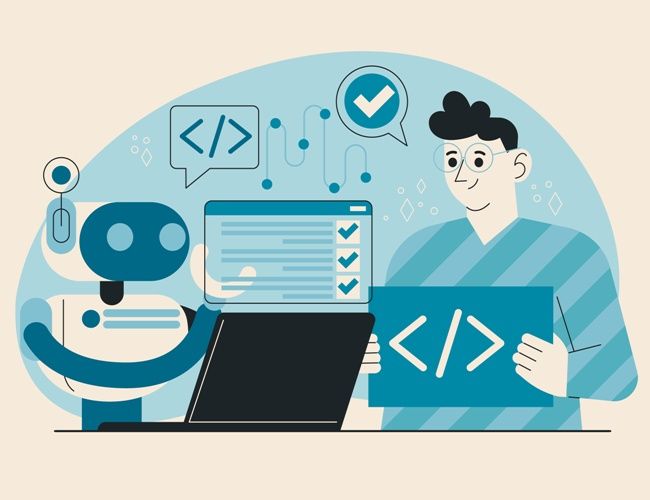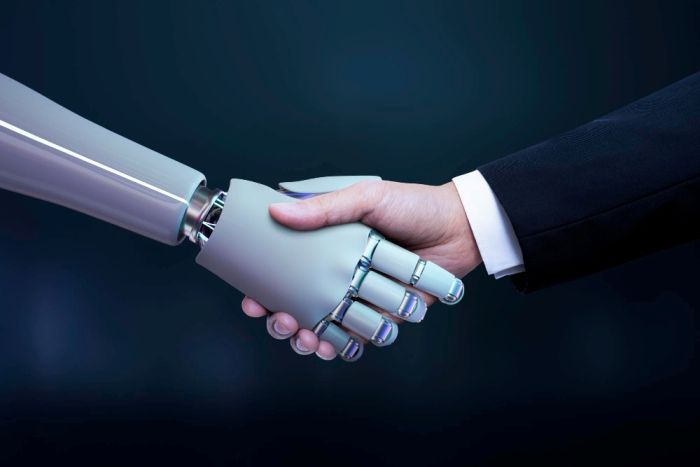Ever wondered how Infosys (tech behemoth from India) managed to shave up to 30% off its overall testing cycle?
You guessed it right, the all so conquering AI (artificial intelligence) embedded solutions are behind it, especially in automation testing.
They took a comprehensive approach to testing by integrating AI and machine learning algorithms that automated testing processes such as test case generation, test execution, and defect detection. Thus eliminating the need for manual labour and resulted in faster and more precise test results.
To make things even better, they embraced continuous testing and integrated it into the Agile development process, leading to speedier feedback cycles and quicker resolution of defects.
Moving on to Artificial Intelligence in software testing, how is Artificial Intelligence transforming the software testing landscape?
As technology develops rapidly, software testing has become essential to software development.
However, the traditional manual testing approach can be lengthy and error-prone, ultimately leading to product delivery delays and increased costs.
Thankfully, with the introduction of Artificial Intelligence (AI), the software testing landscape has undergone a significant transformation.
In this article, we will dive into the role of AI in software testing and the numerous benefits and applications it brings to the table.

What is AI-based testing?
AI-based testing is revolutionising how software is tested, making the process more intelligent, efficient, and effective.
By leveraging the power of Artificial Intelligence and Machine Learning algorithms, testing teams can now comprehensively analyse software products and identify potential issues with greater accuracy.
The use of AI and ML in testing enables logical reasoning and problem-solving strategies to be applied to the testing process, resulting in more precise test results and faster turnaround times.
What are the key benefits of integrating AI into software testing?
Maximising Efficiency and Cost Saving
Manual software testing can be tedious and error-prone, even for the most experienced testers. The repetitive nature of the job means that mistakes are bound to occur, potentially leading to inaccurate results and wasted time. However, with automated software testing, these repetitive steps can be performed with lightning-fast execution and pinpoint accuracy. By reducing the need for manual intervention, AI-based testing can save time and costs, ultimately leading to cost savings.
Achieve Comprehensive Test Coverage with AI-Powered Testing
AI-based testing can take the testing process to the next level and significantly improve software quality. Automating the testing process can examine a broader range of internal program states, memory and file contents, and data tables, resulting in comprehensive test coverage. This increased test coverage ensures that the software meets the requirements and delivers a high-quality user experience.
Gain a Competitive Edge with AI-Powered Automated Testing
Manual testing is a bottleneck for software development, leading to longer time-to-market and higher costs. One can accelerate the testing process, reduce costs, and deliver software faster by leveraging AI-based and automated testing. Automated tests can be executed quickly and reliably, allowing you to identify and address issues before they affect your users. By optimising your testing process with AI, you can gain a competitive edge, improve user satisfaction, and drive business growth.
Applications of AI in Software Testing
Enhancing Software Testing with AI: The Key Applications and Advantages
- Automated test case generation and execution is one of the most significant applications of AI in software testing. With the help of AI, test engineers can generate test cases automatically based on requirements, code changes, and other factors.
The AI algorithms can analyse the software and create test cases that cover all the possible scenarios and edge cases. This not only saves time but also increases the efficiency and effectiveness of the testing process.
AI-based tools like Selenium, Appium, and Testim can execute automated test cases and generate reports, making it easier for test engineers to identify and fix the bugs. -
Real-time monitoring and analysis of software testing results is another crucial application of AI in software testing.
With the help of AI, test engineers can monitor the test results in real-time and analyse them to identify patterns and trends.
This helps in identifying the root cause of defects and fixing them quickly. AI-based tools like Elastic Stack, Kibana, and Splunk can analyse the testing data and provide real-time insights to test engineers. -
Predictive defect analytics is another application of AI in software testing. AI algorithms can analyse the testing data and predict the defects that are likely to occur in the future.
This helps identify potential issues and fix them before they become a problem. AI-based tools like Applitools and Mail can predict defects and provide suggestions for improvement. -
Continuous testing and integration is also crucial application of AI in software testing. AI algorithms can analyse the testing data and provide insights that can help in continuous testing and integration.
This helps in identifying defects and fixing them quickly, which in turn improves the quality of the software. AI-based tools like Jenkins, CircleCI, and Travis CI can automate testing and integration, making it faster and more efficient.


Challenges and Limitations of AI in Software Testing
- Ethical and legal considerations: One of the challenges of using AI in software testing is the ethical and legal considerations surrounding using such technology.
For example, AI-powered testing may collect personal data from users, which could raise privacy concerns. Additionally, AI may not always be able to accurately assess the impact of bugs and errors on users, which could lead to legal issues.
- Limitations of current AI technology: Another challenge is the limitations of current AI technology. While AI can detect specific bugs effectively, it may not be able to see all types of errors. AI may also struggle to identify more complex user experiences or design issues.
Additionally, AI requires significant training data, which can be a challenge for testing scenarios with limited or incomplete data.
- Potential impact on the job market for software testers: AI in software testing can potentially automate certain aspects of the testing process, which could impact the job market for software testers.
While AI may not wholly replace human testers, it could reduce the number of manual testing jobs available. However, the increased use of AI in testing may also create new job opportunities for those with AI development and implementation skills. - Mabl uses machine learning to improve the quality of tests and identify areas of improvement continuously.
- With Mabl, users can focus on developing their application instead of testing it, thanks to the automated testing feature.
- Mabl's AI-powered test execution and analysis feature helps identify and resolve issues quickly.
- Mabl integrates with popular development and testing tools, allowing users to incorporate them into their existing workflow.
- With Testim, cross-browser testing is easy as users can ensure their application functions correctly on various browsers.
- Testim integrates seamlessly with popular CI/CD tools, allowing users to incorporate automated testing into their software development workflow easily.
- The AI and machine learning algorithms are entirely adaptive, making it easy to scan apps' screens and analyse them like the human eye and brain, but with the power of a machine.
- Applitools has excellent Match Level algorithms that traditionally reduce many assert codes, drastically decreasing code maintenance.
- Its automation suites sync with rapid application changes, making it an excellent tool for applications involving visual testing.

Future outlook of AI in software development and testing
The future outlook for AI-driven software testing is promising, with the potential for further advancements and innovations. AI-powered testing tools can significantly reduce the time and effort required for testing while improving the accuracy and efficiency of the testing process.
As AI algorithms evolve, software testing will become more sophisticated and capable of identifying complex issues that human testers may miss. In addition, AI can be used for predictive testing to anticipate potential problems before they occur.
In the future, we can expect to see more AI-driven testing solutions that incorporate machine learning, natural language processing, and other advanced technologies to improve software quality and reduce testing time.
Why should you embrace AI-powered testing?
Artificial Intelligence (AI) has brought a significant revolution in software testing by providing faster and more accurate defect detection, thereby improving the overall quality of software products.
As such, software development teams are urged to embrace AI-powered testing to improve their testing processes and deliver high-quality software products to their clients. Using AI-powered testing tools, teams can reduce testing time and minimise costs and efforts while ensuring better software performance and user satisfaction.
Therefore, software development teams must leverage AI-powered testing to optimise their software development processes and achieve tremendous project success.
Frequently Asked Questions About AI in Software Testing
Ques 1. What is the potential impact of AI on the job market for software testers?
Ans 1. The increasing use of AI in software testing could potentially automate certain aspects of the testing process, which may impact the job market for software testers. While AI is not expected to replace human testers completely, it could reduce the number of manual testing jobs available. However, this shift towards AI in testing may also create new job opportunities for individuals with AI development and implementation skills. Software testers must adapt and develop new skills to stay relevant in a changing job market.
Ques 2. How can businesses benefit from AI in software testing?
Ans 2. Businesses can benefit from AI in software testing by reducing the time and cost associated with manual testing, improving test coverage and accuracy, and accelerating time-to-market. This can help businesses deliver high-quality software faster, improve customer satisfaction, and gain a competitive edge in the market.
Ques 3. What are the limitations of using AI in software testing?
Ans 3. When it comes to using AI in software testing, there are several limitations to consider. For instance, high-quality training data is required to ensure accurate results, and there is a risk of bias in the AI algorithms. Additionally, human intervention and oversight are needed to guarantee the reliability and precision of the testing process. It is also important to note that while tests can be designed to detect known issues, testing is impossible for every possible condition, and testing cannot uncover unknown or missing elements. Nevertheless, despite these limitations, AI in software testing can provide significant benefits regarding efficiency, accuracy, and scalability.
.Ques 4. What are some of the best ai testing tools?
Ans 4. Mabl is an AI-driven testing platform for web applications. It provides automated testing and monitoring for web applications, allowing users to create and maintain automated tests without writing code.
Features:
Testim is an automation tool that lets users create, execute, and maintain automated tests for web applications without coding. It uses AI to assist users in test creation and maintenance, simplifying the process.
Features:
Applitools is a cloud-based visual testing platform that uses AI to automatically detect and compare visual differences across multiple devices, browsers, and screen sizes. It offers an end-to-end software testing platform powered by Visual AI and is used by engineering, test automation, manual QA, DevOps, and Digital Transformation teams.
Features:

